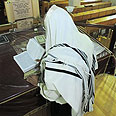
10 commandments for Yom Kippur
Don’t know what to do at synagogue during holiday prayer? Should you stand or sit down? May you let your children drink during service? Here's a short guide for the Day of Atonement
1. Dress code
It is customary to dress in clothes honoring the sanctity of the synagogue. Those who really want to connect to the Yom Kippur atmosphere can wear white.
As for shoes, it is important to remember that one must not wear leather shoes on Yom Kippur. Feel free to wear sneakers, Crocs, etc. In any event, the guard at the entrance will not be checking your shoes.
2. When baby cries
There are organized synagogues that offer babysitting services as part of the deal. If your synagogue doesn't, worshippers will be patient to light disturbances by babies or small children. Otherwise, take your time and calm them down outside.
3. Where's the kippah?
Many synagogues offer their guests skullcaps and holiday prayer books. It's advisable to bring your own kippah from home. Otherwise, gently ask if there are any skullcaps or prayer books available. If they run out of books, you could ask to share a book with someone else.
4. Hey, that's forbidden
You must not use your cellphone during prayer. Yom Kippur is just like Shabbat in this case – phones are considered forbidden. If you really can't do without it, at least switch to the vibrating alert…
Another forbidden act is photographing: Regardless of the fact that the cantor is not an actor and the synagogue is not a theater, you must not take pictures of the worshippers or record the cantor until the end of the holiday.
5. Seats
Contrary to what many believe, the State authorities do not pay synagogues' electricity, water and cleaning bills. Synagogues are maintained only from donations and by selling seats. On the other hand, the synagogue is a public place open to all Jews. There isn't always room for everyone, and naturally there's an advantage to arriving early in the morning.
Just like any other public place, we often see many visitors around the entrance, but when we go inside we find out that like a bus – a lot of vacant seats can be found. If that doesn't help, you're allowed to stand. It's not like you're blocking anyone's view…
6. Is there parking?
Naturally, after the holiday begins one must not park near the synagogue so as not to offend the worshippers.
As for disabled people, many synagogues are wheelchair accessible – but not enough. Newer synagogues are more sensitive to these needs. In the older synagogues, managers try to make adjustments to help elderly worshippers. You should inquire about it in advance.
7. What do you do when you're thirsty?
Children should be allowed to drink, as should patients in need of medication. As for healthy people, walking over to the tap and drinking may not be looked upon favorably.
Some good advice for those of you who feel thirsty: Think about the cantor who fasts for 25 hours and yet raises his voice without any liquid.
8. Now you stand, now you sit
In recent years there are new prayer books which signal when one should sit and when one should stand. And in general, there's no shame in following what everyone else is doing…
9. Is everything okay?
Have any questions? Having trouble with the prayer book? Don't be ashamed to ask for help, or alternatively - to politely reject any help offered. At the end of the day, everyone comes to shul with good intentions – after all, it's Yom Kippur.
10. Honorary role
"I have a beautiful voice, why don't they give me the honor of singing?" Not every person with a nice voice has the privilege of singing or reading a prayer. There are known and conventional melodies. If you're convinced that you know the melody, in most cases no one will object to your participation.
And another "honor" – sniffing tobacco: It's not drugs, and on the other hand it's not food either. Tobacco is intended for smelling. It is customary that some worshippers show up with small tobacco packs and offer them to their friends to ease the fast. These are usually regular worshippers who provide the goods all year round, and we've already heard complaints from veteran "suppliers" who feel their clients are being stolen…
Written by the Ayelet Hashachar Chavrutah organization, which holds weekly learning sessions that serve to open the channels of communication between religious and non-religious.










